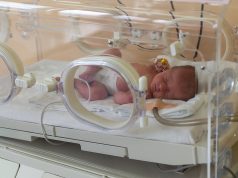Lower risk of spontaneous preterm birth at less than 37 and less than 34 weeks of gestation
TUESDAY, Jan. 17, 2017 (HealthDay News) — Among women at risk for preeclampsia, antiplatelet agents reduce the risk of spontaneous preterm birth at less than 37 and less than 34 weeks of gestation, according to a meta-analysis published in the February issue of Obstetrics & Gynecology.
Elvira O.G. van Vliet, M.D., Ph.D., from the University of Sydney, and colleagues conducted a meta-analysis using data from 17 trials (with 28,797 women) to examine whether use of antiplatelet agents reduces the risk of spontaneous preterm birth. Data were included from studies that randomized women to low-dose aspirin-dipyridamole or placebo-no treatment as a primary prevention strategy for preeclampsia.
The researchers found that the risks of spontaneous preterm birth at less than 37 weeks and less than 34 weeks of gestation were reduced (relative risks, 0.93 [95 percent confidence interval, 0.86 to 0.996] and 0.86 [95 percent confidence interval, 0.76 to 0.99], respectively) for women assigned to antiplatelet treatment versus placebo or no treatment. The relative risk of having a spontaneous preterm birth at less than 37 weeks of gestation was 0.83 (95 percent confidence interval, 0.73 to 0.95) and 0.98 (95 percent confidence interval, 0.89 to 1.09) for women who had a previous pregnancy and for women in their first pregnancy, respectively. Across all other prespecified subgroups the treatment effect was stable.
“Antiplatelet agents reduce spontaneous preterm birth in pregnant women at risk for preeclampsia,” the authors write.
Full Text (subscription or payment may be required)
Copyright © 2017 HealthDay. All rights reserved.








